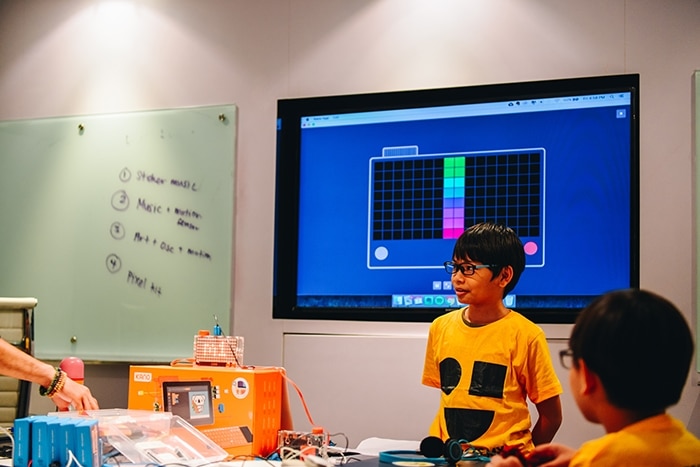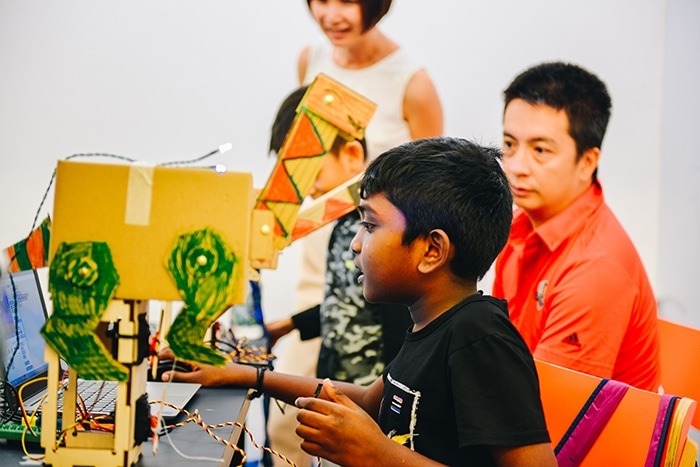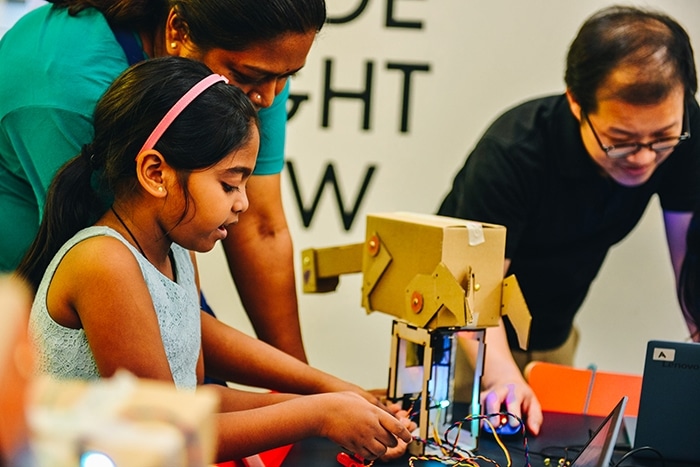The post The Kids of CITCx on What They Learned through an Interdisciplinary Approach to Coding appeared first on Saturday Kids | Coding, Digital Literacy for Kids & Parents.
]]>The CITCx curriculum departs from traditional subject-based learning by synergising different disciplines – like science – with code, and linking theory to real-world applications.
For many kids, this was their first taste of an interdisciplinary approach to coding and STEM, and their first introduction to science. Here’s what they taught us about the power of opportunity and interdisciplinary tech education.
Synergising disciplines opens up possibilities for imagination, curiosity, and application.
It could be argued that trying to teach kids about two things at once encourages breadth at the expense of depth. But what we’ve seen is that widens kids’ sense of possibility, stirs up their interest, and encourages them to synergise information and connect the dots from a young age.
In this case, as kids learn to code, science concepts and their real world applications are integrated into the curriculum – something that excited kids like Kelly and David, who are both 8 years old.


“We learnt 2 things at one time! I was very excited to get to learn science,” exclaimed David. Because Science is only introduced to the mainstream school curriculum for older kids, the camp exposed them to concepts like photosynthesis and gravity, piquing their curiosity and interest in the subject through accessible entry points like videos and games.
For example, they worked on a game about space – Kelly and David’s favourite project of the camp. “I have never been to space before and I want to know what it looks like,” David said. Combining that knowledge with code, Kelly programmed a game with rockets.
Leveraging their basic coding skills, they could apply what they learned by creating projects to visualise and apply their learnings in block-based platform Scratch, connecting the dots with their own experiences and curiosities. Like Ethan, age 9, who created a garden-themed animation. “I have plants at home, and it’s pretty fun. I added an extra feature to my project so that after it grows into a rose, it starts to wither.”
Learning life skills through code is more important than learning to code.
Not every child dreams of being an engineer, and the world has no need for an entire generation of software engineers. But what every child – whether from a place or privilege or disadvantage – does need, is a set of soft skills that’ll help them thrive and navigate the complexities of the world.


Beyond code, we emphasise life skills like managing failure, teamwork and creativity that’ll enable kids to solve problems, whether in the workplace, in their personal lives, or for other people.
For example, anyone who’s tried to code will know that debugging is an inevitable part of the process, and that perseverance is a key quality that any coder who hopes for their project to see the light of day needs to have. It’s no different for our kid coders . While trying to build a game in Scratch, David had envisioned characters against a changing backdrop. There wasn’t enough time for him to make this work during class, but he’s resolute about not giving up. “I didn’t manage to solve it but I’m still trying to solve it at home!” he told us at the end of the camp.


Another who took to the challenges in class exceptionally quickly took it on himself to help his classmates out – going between tables to help his friends troubleshoot their projects. It’s not the most complicated coding projects that make us the proudest, but instances like this that make us hopeful about the kids shaping the future.
Curiosity in the classroom is just the start.
One of our favourite questions to ask kids is what they want to do with a mastery of coding. Kaelyn, age 11, wanted to make a model of the Eiffel Tower, while Luke, age 12, wanted to make a website. Moshe, also 11 years old, wants to create a material that could change shape. “I would use it to help the economy by constructing buildings and reaching high places to build tall buildings.” he told me.
Ethan, Kelly and David wanted to make more of their own games. “I also wish to make a platform game, because it’s very hard,” said David. “How in the world can you make the person stand on the platform?” he wondered aloud.
That curiosity is the perfect place to start.
As a social enterprise, our mission is to inspire kids to create a better future with code – whether that’s an entertaining game, or an engineering marvel. The reason why we exist is to equip kids with the skills and support they need to realise their potential and the potential of tech. This is a particularly pressing gap for kids from lower-income families or disadvantaged circumstances. Technology and education can be great levellers, but we have to act fast as a community to bridge the gaps before they widen, so every child has a fair shot at shaping the future in the 4th Industrial Revolution.
Back in 2020, we launched CITCx as an extension of Code in the Community to meet the need for disadvantaged kids to learn in ways that enable them to lean into the future. Companies and individuals have stepped up to the plate to lend their support to these kids, and we tell these stories so as to reach anyone with an eye on the future of work and learning, who wants to ensure that no kid gets left behind. If that’s you, we’d love for you to join our movement alongside the likes of impact-driven tech companies and individuals like Skyscanner, Google, EPAM, SAP, IMDA, GovTech, Cognizant, Micron and more. Say hello here.
The post The Kids of CITCx on What They Learned through an Interdisciplinary Approach to Coding appeared first on Saturday Kids | Coding, Digital Literacy for Kids & Parents.
]]>The post Beyond Learning to Code: What Aspiring Software Engineers should know appeared first on Saturday Kids | Coding, Digital Literacy for Kids & Parents.
]]>Our friends at Code Chrysalis – a software engineering bootcamp – should know, having trained and placed numerous fresh software engineers in Tokyo, Japan. At a recent webinar, they shared insights into the tech industry and what people curious about a future in software engineering should know and brace themselves for in a time of COVID-19 and the 4th Industrial Revolution. Here’s the the lowdown.
Beyond learning how to code, here’s what you might not know about becoming a software engineer.
Mindset is key.
Being a software engineer is a constant battle of learning new things. Aside from the need to pick up new technologies, libraries, and frameworks, software engineering is all about learning what you need to know to solve new problems and build solutions. As such, a growth mindset is key and what enables anyone to stand out in a sea of technically competent people.
While a computer science degree or a coding bootcamp can help you develop mastery of programming theories or languages, the industry is constantly changing. Technical chops aside, perhaps the most important quality a prospective software engineer should develop is that of being an autonomous learner, i.e. learning how to learn.
Soft skills like empathy and communication matter (much) more than you think.
A large part of being a software engineer is being a part of a larger team driving the product that you’re building. Beyond just programming, the role involves receiving and leveraging feedback, being able to take on different perspectives, and collaborating with different stakeholders – from designers, product managers, marketeers, to other engineers. To navigate this smoothly requires interpersonal skills that traditionally have been under-valued in the tech industry.


Plus, in a time of remote work, communication and empathy are more important than ever. Now that it’s not unusual for new hires to have never met their teammates in person, or for meetings to be held remotely, knowing how to communicate and relate to a remote team – and remote customers – goes a long way.
The world needs more software engineers from non-traditional backgrounds!
There’s a lot that we could say about this, but in a nutshell: Product teams need to be as diverse as the users they’re building for, and having diverse perspectives at the table enables a product to grow to its full potential. That’s an issue and a need in the tech industry that schools like Code Chrysalis (for adults) and Saturday Kids (for well, kids) are addressing.
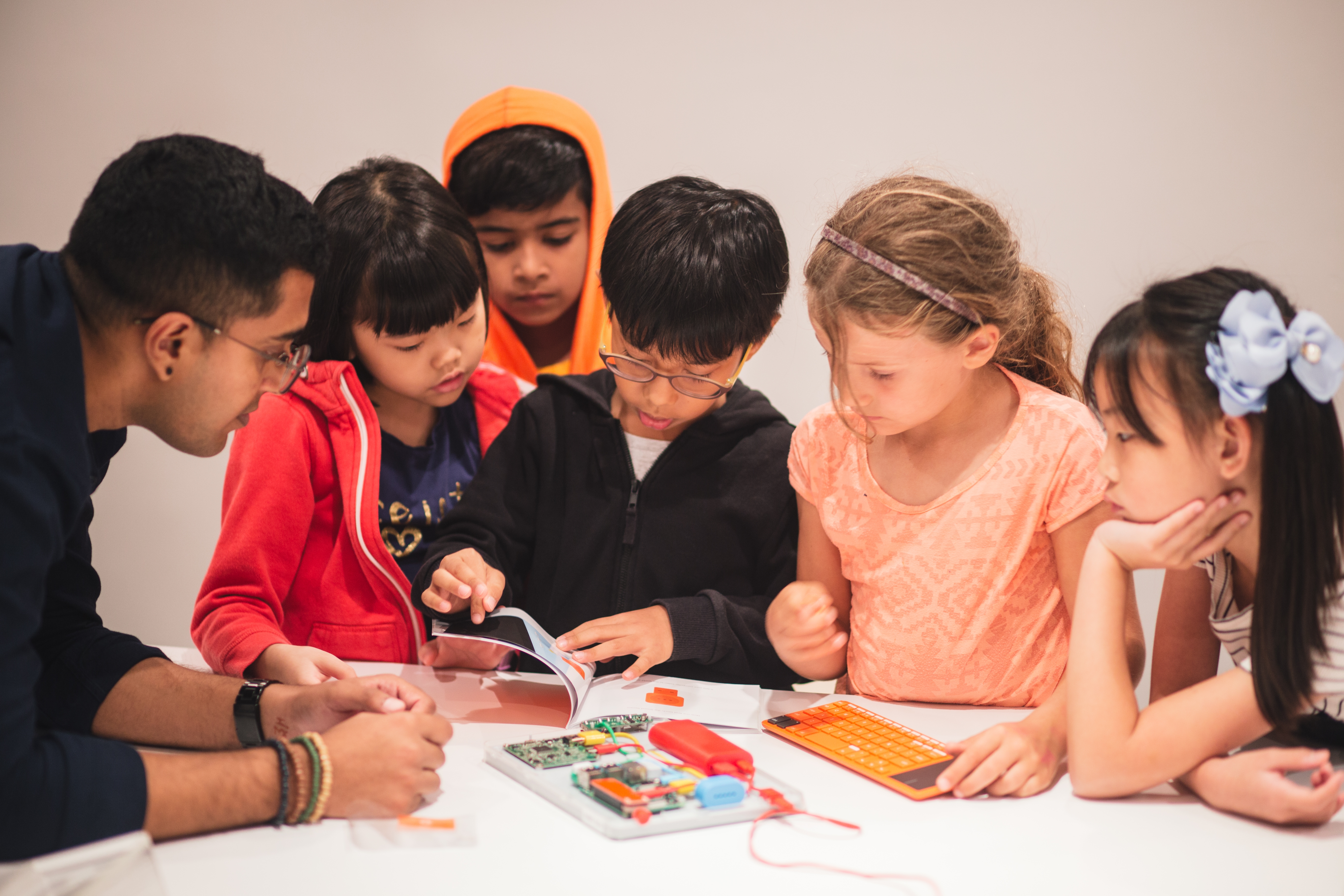
The reason for this is simple – that you don’t know what you don’t know, and bringing more diverse experiences, knowledge, and perspectives to the table can only serve to help a product cover more bases.
That’s not to say that more boys shouldn’t learn to code, but that having someone from an under-represented group that wouldn’t typically be exposed to programming (for example, an underprivileged female or non-binary person) has a ripple effect that positively shakes up the status quo. (As you can tell, we’re here for it.)
So now that you know what you need to be a software engineer, what’s next?
Here are a few suggestions from Kani and Yan, the co-founders of Code Chrysalis.
Leverage free learning resources before making a big commitment.
There’s an abundance of educational content out there for people who are curious about learning how to programme, and a lot of it is available for free. Signing up for a coding bootcamp is a significant investment of time, money, and energy. With all the free resources available online, there’s no reason why an adult eager to explore a career switch should start from zero before committing to a paid programme.
Do your homework and know what you want.
Learning to code opens lots of doors; and while choosing a vocational bootcamp or course, it’s important to educate yourself about the outcomes they’re preparing you for. For example, the ability to code is necessary for both data scientists and software developers.
But coding aside, the two roles require very different skillsets. While the former is research-oriented and data-driven, the latter centers around building and problem-solving. Perhaps it goes without saying, but knowing your inclinations and strengths and doing your due diligence will enable you to make decisions about your learning and career with more clarity.
With great power comes great responsibility.
Tech has a more pervasive role in our lives than ever before, and this influence and power seems only likely to grow in the future. With the ability to code comes the privilege to play an important role in inventing and building the future, and that’s not something to take lightly.


The need to value soft skills and diversity in tech is more important than ever. That’s why Code Chrysalis aims for (at least) 50% female representation in each cohort, and why Saturday Kids is dedicated to creating more access and opportunity for kids from disadvantaged backgrounds, infrastructure-poor communities, and women and girls in tech. This isn’t just limited to people who care about human rights and social justice, but anyone who cares about the quality of tech, and the future it’s shaping.
So, what do aspiring software engineers need to know beyond learning to code? In short: being an all-rounded, empathetic, independent and collaborative human being. Coding is a superpower but it only goes as far as the person wielding it. Use it well!
The post Beyond Learning to Code: What Aspiring Software Engineers should know appeared first on Saturday Kids | Coding, Digital Literacy for Kids & Parents.
]]>The post Friends of Saturday Kids: Yao Yao on overcoming the odds and coding to learn appeared first on Saturday Kids | Coding, Digital Literacy for Kids & Parents.
]]>“As a female in the field of Computer Science, you have to learn how to stick up for yourself, to speak up when uncomfortable, learn to ask hard questions, trust that you’re smart and that you’ll get things done.”
Meet Yao Yao: a friend of Saturday Kids we caught up with when we took a fieldtrip to Chicago to attend ISTE . A computer scientist by training, she has since gone on to do corporate strategy, portfolio management and is currently working on Innovation Management at a maps company called HERE Technologies. She first tinkered with code at the age of 5 in China, and shares her story of how a combination of curiosity and grit enabled her to thrive and find her sweet spot as a female and immigrant in tech.
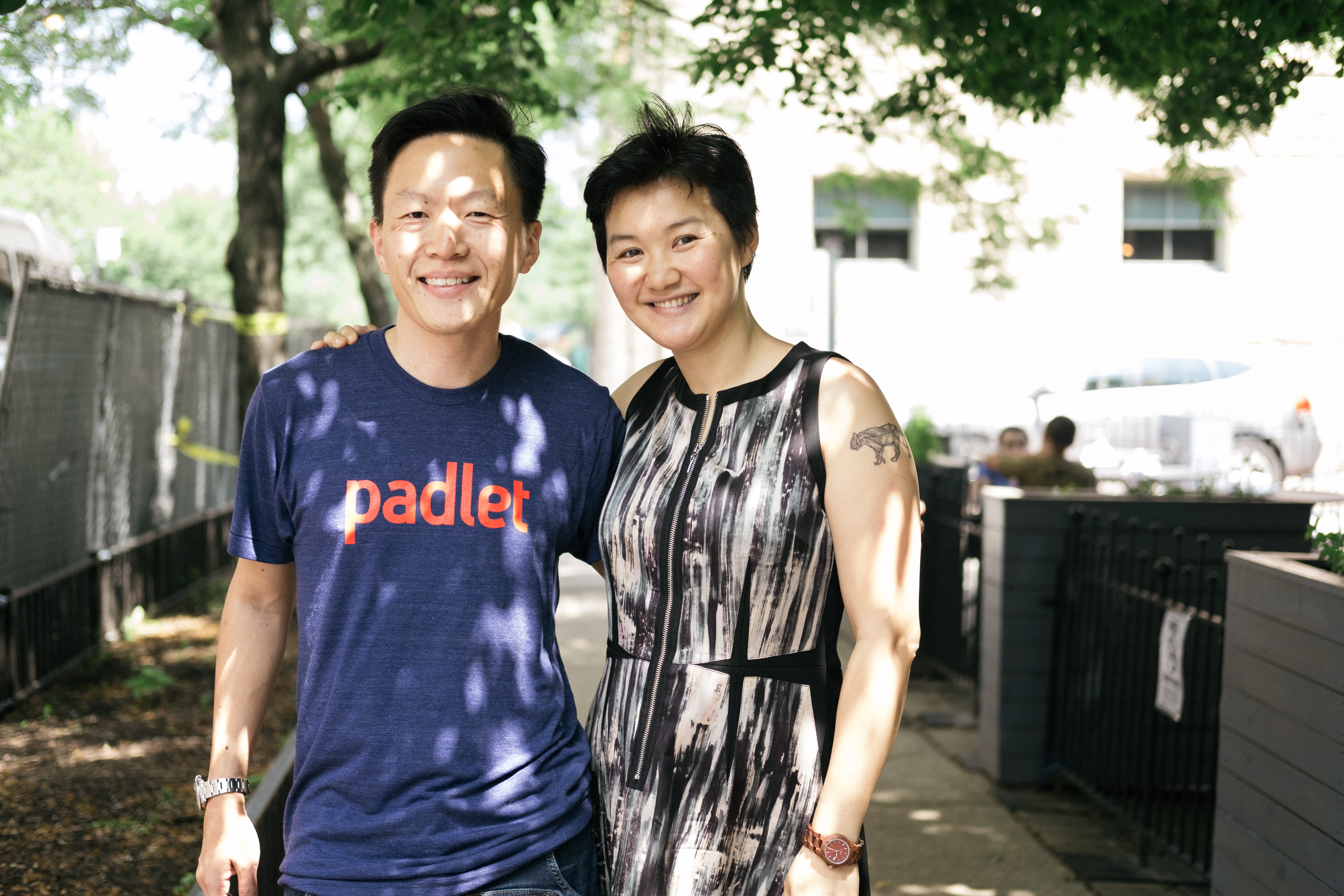
Yao Yao and Saturday Kids founder, John, in Chicago.
Hi Yao Yao! How did you get started learning to code?
“My parents were going through the period where their education was disrupted because of the cultural revolution. My Mum didn’t get a chance to start university until a couple of years after I was born, and she saw it as the only chance to go before she couldn’t go again. And so, my Dad ended up taking care of me most weekdays. At that time, he was working as a hardware and software engineer so he’d take me to his office.
We were really poor so we didn’t have many toys, and I remember just played with broken circuit boards (as toys), and different electronic components, such as transistors.
To keep me busy, he taught me programming when I was around 5. Looking through some of my journal entries, there were gems like “Today, I drew a flower using recursions”.
When I was in elementary school, he started taking me to some of the local programming competitions, and I was would walk in and be the smallest kid. That period was a great bonding time between me and my Dad.
Where I grew up, academia felt quite regimented; in contrast, coding was much more exploratory, and a fun creative outlet for me. I’m thankful for my mum for being progressive enough to look beyond the academics. She used to get called by the school to be told that I had the ability to make top 5 or top 10, and asked whether she would consider cutting down some of my extracurricular activities. My Mum would resist – saying that she would prefer for me to be ‘good enough’ and maintain my interests, making sure I stay was still curious and still exploring explore what I was interested in.
It’s a long way from China to Silicon Valley. What brought you to where you are today?
“When I was 16, we moved to Silicon Valley. My parents had always wanted me to escape the Chinese college entrance exam cycle. They were worried about the impact on my character because they saw kids hiding good study materials and plotting against each other to try to come out on top. My Dad didn’t want me to lose “my innocent smile”, and that was the reason for them bringing me out here.

Yao Yao as a child.
It’s very self-sacrificial of my Mum, because she had a great career as an accountant in China, and the minute she came to US, that license was rendered useless. She ended up going through a technical training program where she learned how to map circuit board layouts and switched careers completely.
It kinda runs in my family – with every situation, we just go and learn what we need to figure it out.
I went on to study Computer Science and finished a Masters Programme in Artificial Intelligence (AI) at MIT, before working as a programmer at IBM. After 3 years, I received full sponsorship for an MBA at Harvard. They were intrigued about my experience as an immigrant, learning programming and new languages, and having the combination of curiosity and grit to navigate different situations. That really opened many doors – I’ve gone on to do corporate strategy, portfolio management and I now work on innovation management at Here Technologies.”
What has your experience been like, as a female and immigrant in tech?
“Ever since I was a kid going to coding competitions, I was used to being the only girl everywhere and it was a character building experience – I learned not to back down. In that environment, you had to hold your own; there was no other role model around.

A snapshot from after Yao Yao moved to continue her studies in Silicon Valley.
And now as a female in the field of Computer Science, you have to learn how to stick up for yourself, to speak up when uncomfortable, learn to ask hard questions, trust that you’re smart and that you’ll get things done.”
Now that you’ve spent so many years working across different roles in tech, what have you learned from this incredible journey?
“Programming is a life skill to me: how you plan, how you use resources efficiently; especially now with the libraries and a lot of things are written for you, you need to figure out what you need and how to get it. This also means you’re not working in isolation but as a part of a vast network. These are important life skills that you develop.
Working in technology, you see how quickly tech really renders basic manual labour obsolete. Robots are going to perform many functions so much better, and the people left are the ones who are able to think – creative thinking, strategic planning, critical thinking – these are really hard to build with AI. If you’re not embracing tech, you’re doing your kids a disservice.
Programming really takes you out of that frame of rote learning and thinking. It’s more about: How do I approach the question? How do I tackle it? How do I build a plan to execute? You’re constantly improving to become more efficient, trying to leverage all the resources.
It’s a comprehensive way to develop those skills that the other activities don’t really bring altogether.
That’s why I’m so invested helping my kids build problem-solving skills, critical thinking skills, ability to be a good communicator (because in programming, you also have to comment on your code, otherwise no one else will understand and be able to use your code). I caught my son (8) teaching my daughter (6) how to program the other day, it’s really sweet. We start with simple things – little activities for them to tinker on the iPad with Scratch Junior, and if they have questions, I try to encourage them to see if they can figure things out by themselves first.
Everything’s really coming into the package when you learn programming – there’s planning, problem solving, finding resources, communication, and efficiency.

Yao Yao and two of her kids!
It’s a fun activity to do with your kids too – just like me and my Dad, and it holds such special memories for me.”
. . .
Yao Yao’s story reminds us of why we do what we do – the lasting impact of “aha” moments, and how transformative a superpower like coding can be, when you apply it with a little bit of creativity, inventiveness, and resourcefulness. Thanks Yao Yao for the conversation – through Saturday Kids, we hope to inspire many more kids to code to learn and open up worlds of possibilities for them in the process.
The post Friends of Saturday Kids: Yao Yao on overcoming the odds and coding to learn appeared first on Saturday Kids | Coding, Digital Literacy for Kids & Parents.
]]>The post #CodeintheCommunity: When we teach kids how to code, what do they learn, really? appeared first on Saturday Kids | Coding, Digital Literacy for Kids & Parents.
]]>This is the second in our #codeinthecommunity series of articles exploring what it means and what it takes to create access to computer science and computational thinking for communities that might not typically have these opportunities. We’ll be sharing stories beyond the impact metrics and hear from some of the people who made Code in the Community possible.
What does it mean to bring coding to the community? At Saturday Kids, we’re convinced that digital literacy is not an end in itself but a means to make kids more curious, inventive, and resourceful. Regardless of whether kids ultimately end up pursuing further education or careers in tech, computational thinking is gaining recognition as a valuable life skill and designing learning as a joyful experience can unlock doors for kids to imagine all fields of possibilities. But what does this look like? When we teach kids code, what do they learn, really?
We spoke to a few of the parents of kids we’ve been fortunate to get to know over the course of Code in the Community and our Pay it Forward initiative to understand the impact of our programmes on their kids – here are some of the common threads we pulled out from conversations we had with the adults who know them best:
-
Learning to code helps them lean into the future

More often than not, it’s the envisioned utility of programming that forms the initial value proposition for parents. And while grooming a generation of software programmers is not on our agenda, a strong foundation in digital literacy equips kids with a deeper understanding of the times we live in.
As Anbu, the father of Ajay, one of our participants in our “GAME ON! Scratch Masters Design Your Own Game” camp this December explained, “I think coding is necessary for all kids in order to survive and learn and do more things, whatever field they’re going in to. Everything is in need of code. I think it’s the best thing we can provide them at this age.”
-
Unlocking their happy place and discovering the joy of learning
It’s true that not all kids take well to coding – it needn’t be said that many of us are born with an inclination or aptitude towards some fields or disciplines, and with less ease for others. Likewise, the local education system as it currently stands isn’t designed with sufficient latitude for all kids to thrive. That said, we definitely believe that all kids have it in them to find the joy in learning, and few things make us prouder than knowing that kids have found their happy place at Saturday Kids!


Melissa Shepherdson, whose son Ethan participated in “Become a Rock Star Code DJ”, was surprised by how he would come home after class and immediately want to continue working on his Scratch project. “Because it’s fun, he enjoys it,” she adds
While a developmental language disorder makes certain academic subjects less accessible to her son, being able to explore different mediums like coding and robotics outside the pressures of an academic setting helped Ethan find his sweet spot, and uncover what his psychologist had described as his brilliance. “What’s good about CITC is that he got to exercise that part of the brain and have fun doing it without feeling stressed about academia,” his Dad, Russell, shared. “


Seetar, whose son Sarveesh and daughter Sadhanaa took part in “Prehistoric Predators: Into the Wild World of Tech”, recalls how Sarveesh “came home and said, “‘I created this, I made this dinosaur that can move using this technology’. He had fun and so much to say. It really had a good impact.” Moreover beyond his enthusiasm, it was one of the rare times that he could sit still and concentrate in spite of his hyperactivity.
-
Coding to learn
Because we do things a little differently from most schools, kids learn differently too.
As Russell, Ethan’s Dad, said, “In CITC, there’s no pressure on the kids. They’re allowed to do it according to their own pace as long as they get to their final destination in terms of the project. It’s not a typical school setup where the syllabus still pushes on week after week even though the kids have not absorbed the content. In this situation, volunteers are there guiding; they’re always there for the kids.”

Adopting a creative programming approach also allows kids to take the driver’s seat and develop soft skills peripheral to just coding. For Ajay, his parents appreciate that he gets to exercise both his creativity and analytical strengths to create a product he can call his own.
This approach also cultivates self-motivated learners who are proud to own their work, like Sarveesh and Sadhanaa.“When [my kids] came home they opened the programme they created and showed it to their Dad, their Grandma… there was a lot of expression, visual communication, cognitive thinking, everything,” said Seetar.
-
A growth mindset and creating access
At Saturday Kids, we believe kids will invent the future, and through CITC and PIF, we want to open doors for kids from all backgrounds by unlocking their innate curiosity, resourcefulness, and inventiveness to do this.

That’s why we love stories like Sadhanaa’s, whose Mum, Seetar, was initially worried about whether her daughter who’s not particularly interested in technology would take to the Saturday Kids 5 day holiday camp. “When she told me ‘I wanna build a dinosaur’ and she talked about Hummingbird and all that, I was very shocked! She managed to do it.”

And while we’re not trying to make an engineer out of every child, we want to create access to possibilities like these, imagined by Ajay, aged 10: “there’s quite a lot that could be possible. I sometimes feel I want to be an inventor, or actually I do feel I want to write some books. I have a lot of things I could do.”
…
Our Pay It Forward initiative brings access to digital literacy classes to kids who might not otherwise afford the opportunity. Saturday Kids matches donations from individuals and organisations to sponsor tickets for kids from all backgrounds to attend our holiday camps and term workshops. The kids of the parents interviewed here are alumna of Code in the Community and our holiday coding camps.
Find out more about our Pay it Forward initiative here, or volunteer with Code in the Community to help us impact more kids. Learn more about Saturday Kids’ social mission here.
The post #CodeintheCommunity: When we teach kids how to code, what do they learn, really? appeared first on Saturday Kids | Coding, Digital Literacy for Kids & Parents.
]]>The post The 3 Things We Believe In At Saturday Kids appeared first on Saturday Kids | Coding, Digital Literacy for Kids & Parents.
]]>We continually strive to inspire a generation of kids to become curious, self-directed learners, and there’s no way we can do this without all the parents who believe in the same cause and are willing to go the extra mile with us. It’s gratifying when they say they identify with what we stand for and they’re glad their kids have such opportunities these days. We most recently spoke to a Saturday Kids parent, Veron and were glad to know that her son loved his class with us.
“Adam enjoyed himself immensely throughout the 5 days camp. He requested to reach class earlier and when he was home, he continued working on his coding projects after dinner. I’ve never seen him so serious about anything before. He has signed up for weekly classes in Jan 2019. “
There are many reasons why we do what we do but here are the top 3:
- “It’s fine to fail, but just don’t bail.”

The idea of failure, or more specifically, learning to deal with failure, is an important conversation for us at Saturday Kids. Failure isn’t a dirty word, and it’s not something we should run away from. Failure is a part of our everyday life and we believe it’s important to teach kids, or rather show them, how to approach it and move past it, rather than avoid it completely (an impossible task anyway and one doomed to fail).
Saturday Kids parent Veron agrees –
“I like that Saturday Kids encourages kids to learn and that it’s okay to fail in the process of learning. When I looked at the SK website, I saw that part of your mission was to get kids to learn to deal with failure. I found that all the other schools were about coding and obsessed with just results but I really loved that SK talked about the process of learning, failure, and learning to move past that because that’s a very important lesson for kids.”
In this article, Montessori educator Victoria, discusses failure and how we can encourage our kids to embrace their failures in a healthy way. It’s something that deeply resonates with us, and we hope that it does the same for you too.
-
Kids learn better when they have fun.
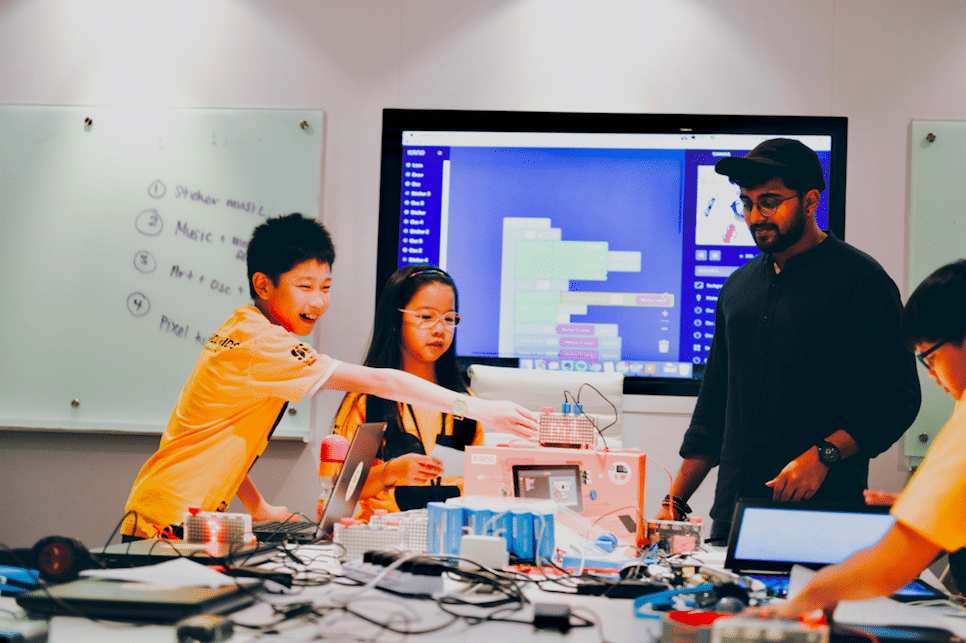
This is again something we’ve talked about a fair bit. Our founder/CEO John shared his thoughts on this while he was at ISTE earlier this year. Check it out here. To recap:
Play is one of the core principles at Saturday Kids. We believe learning should feel like play. What does play mean in this context?
Not just laughter and having fun (although that is an important part of play). Not just the activity. It’s the attitude of testing, experimenting and trying, which leads us to two other core principles at Saturday Kids. Learning happens by doing. Failure is reframed as iteration. Play underpins everything we do at Saturday Kids. Our goal is to make learning fun again so kids enjoy the process instead of just focusing on the outcome. When kids enjoy learning, they become self-motivated learners and our job as educators is pretty much done.
Veron was amazed that her son Adam would insist on coming early for his holiday camp classes, “Whenever I send him for enrichment classes, he’s usually quite unfocused and doesn’t really enjoy it but when it came to coding classes, it’s the only one he thoroughly enjoyed. He requested to go early everyday on all 5 days of the camp and troubleshoot his project. He really enjoyed the classes because he was having fun and he’s asked me to sign him up for weekly classes now as well.”
-
Learn to code, code to learn

Coding is a great skill to have, especially in this day and age. We see coding as one of many, many ways to get your kids curious about the world around them. The big question we ask ourselves at Saturday Kids everyday: What if kids are intrinsically motivated to learn? We can’t teach kids everything there is to know but what we can do is encourage them to look at problems and think, “I can figure this out myself”.
Saturday Kids learn how to learn.
No lectures. No memorisation. No ONE right answer. Like real life, we’re all about trying things out yourself, failing, figuring what went wrong and trying again. These are the skills and mindset that will last a lifetime and how we learn in real life. Let’s get kids to learn how to learn. Because the kids who learn to learn become curious, inventive, resourceful human beings who solve real world problems to make a meaningful impact.
The post The 3 Things We Believe In At Saturday Kids appeared first on Saturday Kids | Coding, Digital Literacy for Kids & Parents.
]]>

